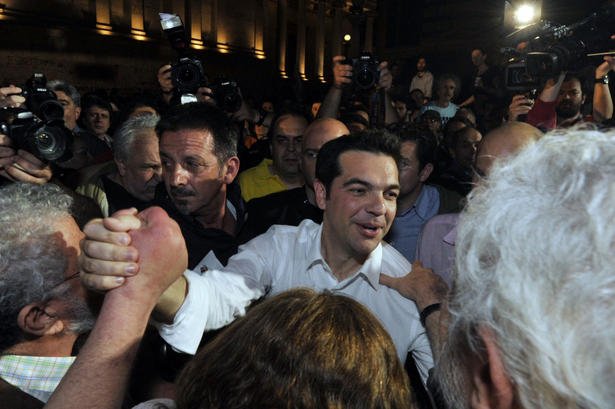
Parties in Greece are making their last pitch for votes ahead of a repeat election on Sunday seen as crucial to the debt-laden country’s future in the eurozone.
New Democracy, the pro-bailout conservative party which narrowly led at the ballot last month, is due to hold its last big campaign rally.
Syriza, the anti-bailout bloc which surged to second place in May, held its final rally in Athens on Thursday.
Unofficial opinion polls suggest a fall in support for anti-bailout parties.
Under Greek election law, official opinion polls are banned in the two weeks before the election.
Tough austerity measures were attached to the two international bailouts awarded to Greece, an initial package worth 110 billion Euros ($138 billion) in 2010, then a follow-up last year worth 130 billion Euros.
While five of the seven main political groups reject the last bailout, only one – the Communists – wants the country to abandon the euro.

Germany, which has the eurozone’s most powerful economy, insists Greece, like other member-states which have received international bailouts, must abide by the austerity conditions.
German Bundesbank (central bank) chief Jens Weidmann repeated the warning on Friday, adding that the eurozone could not allow any country to “blackmail” it with the threat of financial contagion.
At Thursday’s rally, Syriza leader Alexis Tspiras renewed his pledge to tear up the bailout conditions, which involve drastic spending cuts, tax rises, and labor market and pension reforms.
“The memorandum of bankruptcy will belong to the past on Monday,” he told supporters in Omonia Square.
“Brussels expect us, we are coming on Monday to negotiate over people’s rights, to cancel the bailout.”
He pointed to the huge bank loan package deal between the EU and Spain on Sunday, arguing a bailout was possible without the kind of drastic cuts demanded of Greece.
“Spain negotiated and succeeded in taking financial support without a fiscal consolidation package, despite the lenders’ threats and blackmail,” Alexis Tsipras said.
Interviewed by Spanish daily El Pais, Jens Weidmann called for the eurozone to impose broad conditions on Spain over its loan package, worth up to 100 billion Euros.
He warned that Greece, but also the Irish Republic and Portugal, had been given the impression that this was a “rescue with no conditionality outside the financial system” and this was “already eroding the commitment to the terms of the existing programmes”.
“But foot-dragging on addressing the structural problems will perpetuate the crisis, and the market reaction reflects this concern,” Germany’s top banker said.
On Friday evening, New Democracy leader Antonis Samaras is expected to address his supporters in the capital’s Syntagma Square, near the Greek parliament.
Antonis Samaras, who wants to ease the bailout conditions, has accused anti-bailout parties of “playing poker” with Greece.
“There is the path of responsibility, in which you are clear about what you want, and we say we want the euro and re-negotiation [of the bailout],” he said, quoted by Reuters news agency.